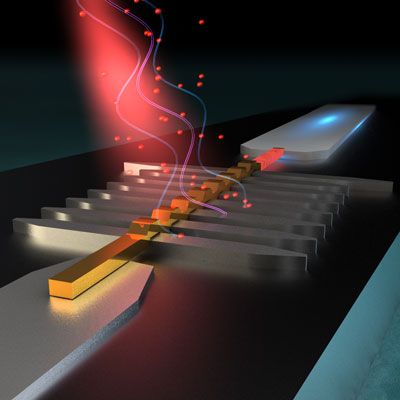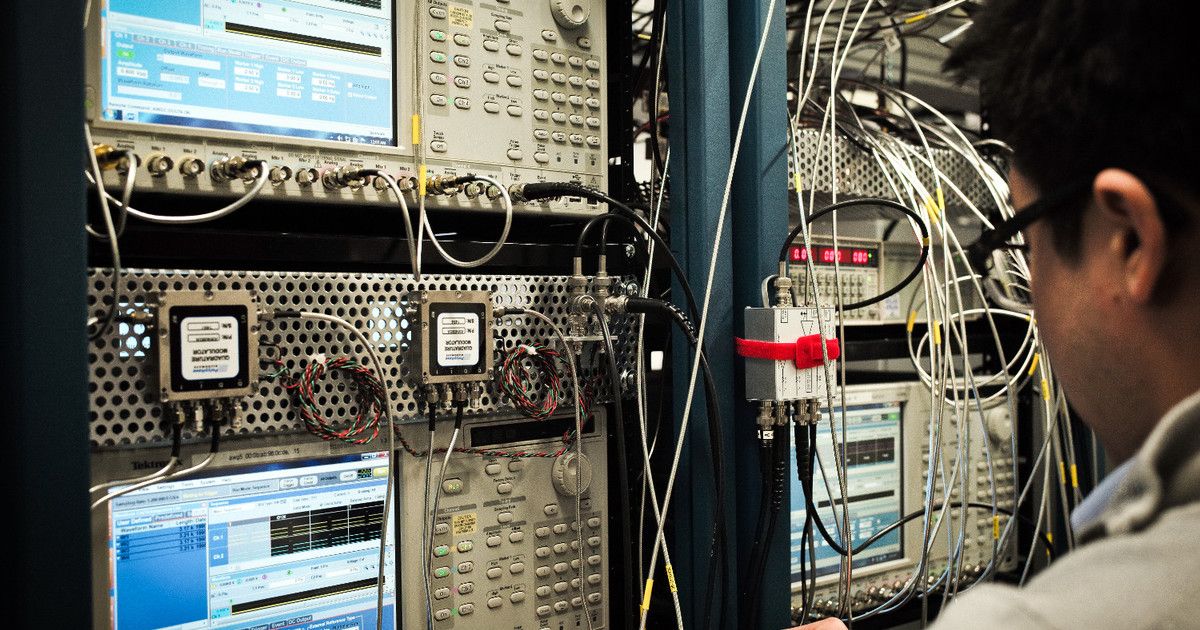Page 10718
Jul 8, 2016
New record in microwave detection
Posted by Karen Hurst in categories: computing, nanotechnology, quantum physics
Aalto University scientists have broken the world record by fourteen fold in the energy resolution of thermal photodetection.
The record was made using a partially superconducting microwave detector. The discovery may lead to ultrasensitive cameras and accessories for the emerging quantum computer.

Jul 8, 2016
How Technology Could Facilitate and then Destroy Legal Immigration
Posted by Zoltan Istvan in categories: drones, law, robotics/AI
My new article on the future of immigration and technology (chipping refugees, AI immigration, and walls vs drones):
We need some authoritative measures to guarantee safe and effective immigration. But then, the robots come.
Jul 8, 2016
How Feynman Diagrams Almost Saved Space
Posted by Karen Hurst in category: quantum physics
Quantum theory amplified Maxwell’s revolution.
Richard Feynman’s famous diagrams weren’t just a way to do calculations. They represented a deep shift in thinking about how the universe is put together.
Jul 8, 2016
Google to experiment with quantum computing-ready algorithms in Chrome
Posted by Karen Hurst in categories: computing, information science, quantum physics, security
Google advances on QC with Chrome.
In preparation for a quantum computing future, Google is testing post-quantum algorithms in Chrome to ensure security in the future.
Jul 8, 2016
Google Tinkers With Chrome Cryptosecurity To Fight Quantum Hacks
Posted by Karen Hurst in categories: cybercrime/malcode, encryption, privacy, quantum physics
Glad Google is doing this because next month could be a real test when China launches its Quantum Satellite.
Today’s encryption is an arms race as digital security experts try to hold off hackers’ attempts to break open user data. But there’s a new tech on the horizon that even the NSA recognizes as crucial to protect against: quantum computing, which is expected to dramatically speed up attempts to crack some commonly-used cryptographic schemes. To get ahead of the game, Google is testing new digital security setups on single-digit populations of Chrome users.
Quantum computing is such a potential threat because it can do many more simultaneous calculations than current computers. Modern binary bits can only be in two states when electric current is run through them: 0 or 1. But the ambiguous nature of the quantum state means its elemental units (known as “qubits”) could be in either state at a time, so two could potentially be in four orientations at one time: 00, 01, 10 or 11. That ambiguity is exponential, so three qubits could be in eight at a time, and so on.
Continue reading “Google Tinkers With Chrome Cryptosecurity To Fight Quantum Hacks” »
Jul 8, 2016
Extra-Coding RNAs Regulate DNA Methylation in the Adult Brain
Posted by Karen Hurst in categories: biotech/medical, neuroscience
A special form of RNA called extra-coding RNA controls the careful targeting to add or remove methyl groups to chromosomal DNA of the adult neuron. The ecRNAs are fundamental regulators of DNA methylation patterns in the adult brain through interaction with DNA methyltransferase enzymes and are involved in creation of memories.
Jul 8, 2016
New security tool addresses Android app collusion threat
Posted by Karen Hurst in category: security
As we reported last month app collusion, where apps work together to extract sensitive data, now represents a very real security risk to mobile devices.
To address this emerging threat, component technology firm Formaltech, today is releasing FUSE, a DARPA-funded tool that detects inter-application collusion and other vulnerabilities in Android apps.
The FUSE platform identifies potential security vulnerabilities and tracks information flow through multiple apps, revealing potential collusion between apps. The tool uses static binary analysis to detect vulnerabilities without requiring the source code of the apps, allowing security professionals to analyze third party apps without the need for vendor cooperation. It operates in the cloud, supporting Android app (APK) analysis from anywhere. Developers and testers can easily drill down into the FUSE interface when FUSE displays errors, warnings and informational alarms.
Jul 8, 2016
Stealthy 3D Printing at Airshow?
Posted by Karen Hurst in categories: 3D printing, military
I hate that I am going to miss the Farnborough airshow.
The Farnborough airshow begins next week and will feature a number of announcements from the 3D printing industry. The show only takes place once every 2 years and will see a flurry of news and displays of the latest aviation technology. These include Boeing’s 737 MAX airliner with its 3D printed LEAP engines and also demonstrations by the first Lockheed Martin F-35 Lighting II, or Joint Strike Fighter, stealth jets to arrive in the UK.
Additive manufacturing company Norsk Titanium (NTi) hopes their announcements will make an equally large splash. During 2016 a number of press releases by the company have piqued the interest of insiders in the 3D printing industry and also in the aerospace industry. Outside of this group, the name Norsk Titanium may be relatively unknown.
Jul 8, 2016
DARPA Goes Full Tron With Its Grand Battle of the Hack Bots
Posted by Karen Hurst in categories: cybercrime/malcode, robotics/AI
Definitely the longer term goal with security bots.
With its Cyber Grand Challenge—a battle of autonomous security software—DARPA is taking us inside the machine.

















